-
NY ASIAN FILM FESTIVAL July 15-31, 2022
NY ASIAN FILM FESTIVAL July 15-31, 2022
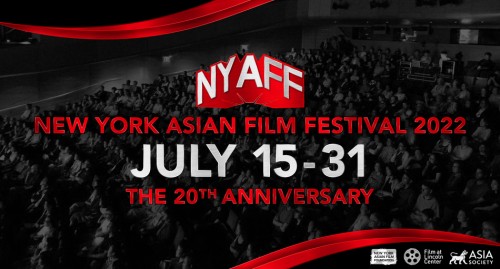
FORUM THREAD
Links to the reviews:
Angry Son 世界は僕らに気づかない (Kasho Iizuka, Japan, 2022)
Before Next Spring 如果有一天我将会离开你 (Li Gen, China, 2021)
Big Night!(Jun Robles Lana, Philippines, 2021)
Broken Commandment 破戒 (Kazuo Maeda, Japan, 2022)
Confession 자백 (YOON Jong-seok, South Korea 2022)
Dealing with Dad (Tom Huang, US, 2022)
Finding Bliss: Fire and Ice - The Director's Cut ]尋找極致的喜悅:火與冰 (Kim Chan, Dee Lam, Hong Kong, 2022)
Funeral, The 頭七 (Dan-Guei Shen, Taiwan, 2022)
Girl on the Bulldozer, The 불도저에 탄 소녀 (Park Ri-woong, South Korea, 2022
Grown-Ups わたし達はおとな (Takuya Kato, Japan 2022)
Happy Together 春光乍洩 (Wong Kar-wai, Hong Kong 1997)
I Am More 모어 (Lee Il-ha, South Korea, 2021)
Intimate Stranger 親密な他人 (Mayu Nakamura, Japan 2021)
Legendary in Action!]大俠 Action! (Justin Cheung, Li Ho, Hong Kong, 2022)
Lesson in Murder 死刑にいたる病 (Kazuya Shiraishi, Japan, 2022)
Life for Sale 售命 (Tom Teng, Taiwan 2021)
#LookAtMe (Ken Kwek, Singapore, 2022)
Mama Boy 初戀慢半拍 (Arvin Chen, Taiwan 2022)
Manchurian Tiger 东北虎 (Geng Jun 2021)
Nothing Serious 연애 빠진 로맨스 (Jeong Ga-young , South Korea 2021)
Offbeat Cops 異動辞令は音楽隊!(Eiji Uchia, Japan, 2022)
One and Four一个和四个 (Jigme Trinley, China, 2021)
Ox-Head Village 牛首村 (Takashi Shimizu, Japan, 2022)
Perhaps Love 장르만 로맨스 (Cho Eun-ji, South Korea, 2022)
Ribbon (Non, Japan, 2022)
Ripples of Life 永安镇故事集 (Wei Shujun China 2021)
Sales Girl, The Худалдагч охин (Janchivdorj Sengedorj, Mongolia, 2021)
Shin Ultraman シン・ウルトラマン(Shinji Higuchi Japan 2022)
Thieves, The 도둑들 (Choi Dong-hoon 2012)
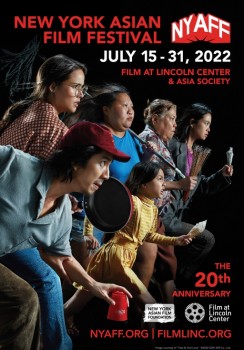
FILMLEAF reviews begin below:
Last edited by Chris Knipp; 07-24-2022 at 12:30 AM.
-
BEFORE NEXT SPRING 如果有一天我将会离开你 (Li Gen, China, 2021)
LI GEN: BEFORE NEXT SPRING / 如果有一天我将会离开你 (2021)
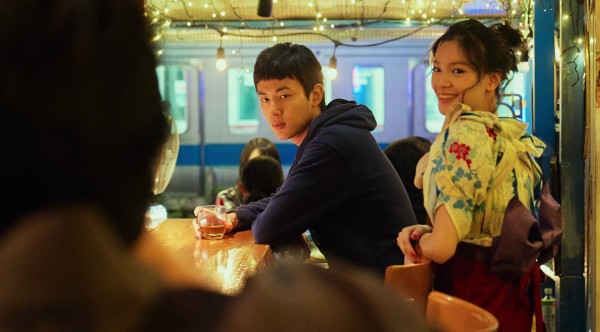
XIE CHENGZE AND QIU TIAN IN BEFORE NEXT SPRING
People come, people go, nothing ever happens, but we enter many stories in this tale of Chinese emigrants and students in Japan gathered around a Chinese restaurant in a Tokyo suburb.
Events are set in a suburban area near Tokyo, Fuchinobe. The focus is Chinese emigrants and exchange students in Japan taking courses to qualify as students and working at multiple jobs to support themselves and send money home.
Through incidents, a mood accumulates in this first feature by a director who has previously done documentaries. He builds on his own personal experiences as a foreign exchange student in Japan. The young actors are fresh and appealing. The characters have in common working and gathering at a Chinese restaurant, Nankokute.
Perhaps the main character is the one-year resident, tall, sweet, shy young Li Xiaoli (Xie Chengze) who is treated as a doofus, and may be Li Gen's alter ego. After many efforts he gets a job at the restaurant through cute former classmate Qiu Qiu (Qiu Tian), and thus meets Zhao Aoki (Niu Chiau. Early episodes feature Zhao, a bitter young half-Japanese, half-Chinese man. He works at multiple jobs and sends money home but is also stealing money from a bank account with his father's bank card, and through that gets arrested, held in jail, and eventually deported.
When Li Xiaoli visits Zhao in jail, the latter gives him a message for Qiu Qiu, who's very pretty and winds up working like a geisha at a restaurant, and expresses indifference to Zhao. Toughened feelings, hardened hearts: but sentimentality in the film, which weeps over an old man who comes back to the restaurant after his wife has died; and niceness on the part of the innocent Li Xiaoli.
There is parallel thread about cancer. A young women with cancer (Xi Qi) bonds with an old lady at the hospital, also a customer at the restaurant. She is Li Xiaoli's older sister, and lives with another Chinese man she fights with. Li Xiaoli is with his sister at the hospital when she has surgery for uterine cancer. But it is all interconnected; that is the art of this kind of piece. There is even the Nankokute cook, who has longed for many years to bring his family to Japan but one evening admits may now have lost the courage to do so. As for Li Xiaoli, he's only in Japan for a year, and when the time comes to an end, he's off. But at the end he overcomes his native shyness for a while to promote the restaurant, which is losing customers, by boldly promoting it out on the sidewalk. He has become emboldened and he has come to care.
This film is precisely observed and engrossing. I'll echo Maria Castaldo, an Italian reviewer whose description of the film is one of the few I can find, who credits Li Gan here with "tenderness and authenticity," and "without lapsing into pathos," but rather "dosing the sweetness," as is done "for the almond syrup in tofu sweets" as specified in a scene in the film. Besides the sourness and the sweetness, there is also the harshness: the couple who fight and Zhao embittered by a drunken and abusive father. In these scenes there is little that is new, but they draw you in anyway.
A significant flaw in the English subtitling is its failure to distinguish where the dialogue being rendered in any one moment is in Mandarin or Japanese. This matters, for following the action, of course, and it is constantly changing.
Before Next Spring如果有一天我将会离开你, 107 mins., debuted at Udine Far East Film Festival Jul. 1, 2021; also Beijing Sept. 19, 2021. Screened for this review as part of NYAFF 2022. (North American Premiere.)
Friday Jul 29, 9:30pm (Lila Acheson Wallace Auditorium, Asia Society)
Last edited by Chris Knipp; 07-05-2022 at 10:50 PM.
-
ONE AND FOUR 一个和四个 (Jigme Trinley, China, 2021)
JIGME TRINLEY: ONE AND FOUR 一个和四个 (China [Tibet] 2021)
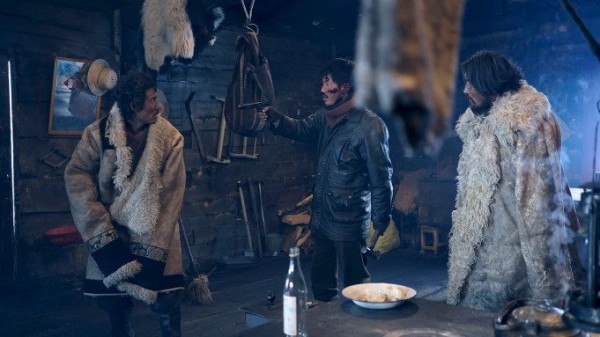
KUNDE, WANG ZHENG, AND JINPA, IN ONE AND FOUR
A well-placed young director from Tibet makes a highly entertaining debut
Reviewing One and Four in in Hollywood Reporter, Elizabeth Kerr notes that this double-cross mystery has "shades of Cui Siwei’s snowbound Savage, Lu Chuan’s Kekexili and, of course, Tarantino’s The Hateful Eight coloring the proceedings." She's right that though it may not reinvent the wheel, it is "a respectable debut from an industry with few voices - Tibetan cinema, where Trinley's father, Pema Tseden, is the most prominent director." One thinks of Panah Panahi, son of Jafar Panahi, whose recent Hit the Road is a stunningly original and very fun debut. This isn't quite on that level, but it's the work of a worthy offspring, compelling, engrossing, highly atmospheric, and in its way also thoroughly entertaining. Variety has a review headlining this as "a Sly, Sparse Tibetan Snow Western."
"Snow western" is a good identifying label. There is non-stop danger and suspicion and things get very tense toward the end with bad guys being singled out for elimination. Reference toThe Hateful Eight suggests the kind of setting: a big, rough-hewn far north outpost that seems as cold inside as out, though you wouldn't want to linger outside where it's freezing and - of course - a blizzard is on the way. Sense of place is communicated through several trips along snow roads and icy heights, also through an ingenious sound design-cum-score combining outdoors with mechanical noise, and cinematography that is both intimate and austere. The exteriors, following forest police following poachers in a wild snowy ride that ends in two vehicles overturned, one man dead, and everybody scarred and bloody, and going back out to hunt for a poacher's trophy of fox fur and antlers.
The car race is replayed for us as recounted by the remaining cop - if he is that, and not an imposter - to the ranger in the cabin, Sanggye (Jinpa), the central figure and our point of identification - and confusion. He's hungover, starving, and goofy, sad and soulful. As the tale unfolds, three men come to the cabin to visit Sanggye, one after another. They all seem to be lying, and one of them seems likely to be the poacher everybody's talking about - that the cop says disappeared after the crash.
Kunbo (Kunde) is the thin, sleazy dude in the big leather robe who came first with the signed divorce paper from Sanggye's wife, qualifying as a messenger who ought to be killed. We don't see this: it happened early in the morning and Sanggye thinks it was a dream; but he comes back later. Before that man identifying himself as a Regional Forestry Police officer (Wang Zheng) comes with reports of the chase after the poacher in a car, where both overturned and the cop's partner died. He is dead; Sanggye sees him. But is the other guy really the cop or the poacher? And is Kunbo the poacher or the poacher's assistant? Sanggye writes everything in his forest ranger’s logbook and we see many an entry; but how much is that to be trusted, or him?
Then another man (Darggye Tenzin) comes saying he's a cop. Well, Trinley keeps things pretty lively. All these grizzled dudes are birds of a feather, and apparently starving. See Sanggye and the first "cop" devouring, piece-by-piece, a rabbit they catch and cook, one of the great starvation meals in movies like the one in De Sica's Miracle in Milan. No, this doesn't provoke thought like Panah Panahi's Hit the Road. But what it does is take you somewhere rough and austere. I'd really like to see how they did those car wrecks in that location. An actioner that never stops being a puzzler, this is a trim and gnarly piece of work.
One and FourI 一个和四个 (‘Yige he sige’), 88 mins., debuted at Tokyo Nov. 2, 2021. Screened for this review as part of the Jul. 15-31, 2022 New York Asian Film Festival at Lincoln Center. North American Premiere.
Saturday Jul 16, 8:00pm (Walter Reade Theater, Film at Lincoln Center)
Last edited by Chris Knipp; 07-20-2022 at 04:57 PM.
-
ANGRY SON 世界は僕らに気づかない (Kasho Iizuka, Japan, 2022)
KASHO IIZUKA: ANGRY SON/ 世界は僕らに気づかない (Japan 2022)
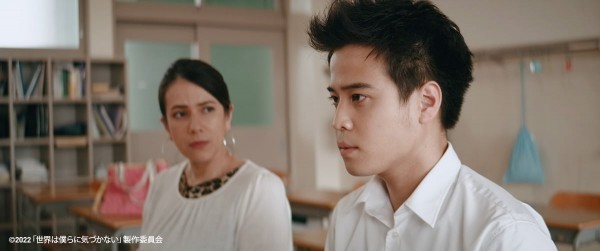
GOW AND KAZUKI HORIKE IN ANGRY SON
The coming of age of a beleaguered "Jappino" is a messy but irresistible tale
As hinted in Li Gen's Before Next Spring, also NYAFF 2022, a film about Chinese emigrants living in a Tokyo suburb, there is no such thing as assimilation in Japan, and here we see that's true even when you were born there if you're not pure Japanese. Kasho Iizuka's entertaining, annoying, and heartfelt little film Angry Son focuses on Jungo (Kazuki Horike), a "Jappino" or biracial Japanese-Filiipino teenager. He lives combatively with this reality in a Japanese suburb with his Filipina bar hostess mother Reina (singer and actress GOW, whose acting is too crude and strident), who loves but maddens him and whom he rails at constantly in private, departing from his generally buttoned-down Japanese manner. He obviously speaks native fluency Japanese and would assimilate if they'd let him.
Jungo also happens to be gay, and he has a strong link with the society: a devoted Japanese boyfriend, Yosuke, whose family accepts his sexuality and their relationship. But Jungo and Yosuke become estranged. It seems permanent, and in the wake of this disaster Jungo, academically unmotivated (and not planning to go on to university), hurt by the regular racist and sexist abuse he suffers from present and former classmates and wanting to find shelter away from his annoying mother, becomes obsessed with searching for for the Japanese birth father he has never met - while still constantly fighting with the well-meaning but sometimes obnoxious mother.
This film engages us with its wealth of human experience. It has two weddings and a funeral, tearful reunions, and a presentable and resilient young protagonist, whose perpetually going around with a camera around his neck snapping photos may make him a cliché artist-autobiographer, but we get the point. The film is also technically unimpressive (the rickety handheld cinematography hardly seems intentional), the casting is often dubious and unappealing, and events play out with a jerky pulse more suited to a meandering TV sitcom than a slightly overlong feature film. But eventually its sincerity may grab you.
There are a number of little scenes where Jungo, the protagonist, is teased or humiliated by classmates for being half-Filipino or for being gay. He was born here in Japan and speaks as far as we know only Japanese. He has to live with the fact that while he gets maintenance payments from his father's family, his mother is in thrall to an extended family in the Philippines she tries to send money to even though she never has any and the electricity in their tiny apartment repeatedly gets cut off. She also violates Japanese manners as he would never do, yelling at her boss at a new job, which humiliates him. He can yell sometimes, perhaps to his benefit, but he also has an inbred sense of Japanese politeness and deference and knows when to bow and be silent and humble.
The meandering structure takes Jungo around the world of Filipino hostess bars as he does some surprising detective work tracking down the family of his birth father, who met Reina in one years ago. It also takes us into the relationship of Yosuke, Jun's boyfriend, with his family and the sudden appearance of a self-declared "asexual" young woman who knows of the boys' relationship and wants to form a three-cornered family with them in which Yosuke will enable her to have children the three of them will raise. Scenes with Yosuke's family show their warmth not only toward the boys' relationship but toward their plan - once they reunite and Jungo pledges steadfastness, love, and loyalty - to take advantage of new local regulations allowing legal same-sex partnerships.
Director Iizuka identifies as trans and as having experienced some of the issues of Angry Son first hand. IMDb shows another film by Iizuka this year, The World for Two of Us, depicting a ten-year relationship of a woman with a trans person (Angry Son isn't listed on the site). Angry Son is a well-meaning and heartfelt film. The director has things to say about subjects new to Japanese films.
Reviewed by Hayley Scanlon in Windows on Worlds and with a directorial interview by Marina D. Richter in Asian Movie Pulse, but information is lacking, including an IMDb page.
Angry Son 世界は僕らに気づかない ("The World Doesn't Notice Us"), 111 mins., was screened for this review as part of the Jul. 15-31, 2022 New York Asian Film Festival where it is in the Uncaged Award for Best Feature Film Competition. It has been shown at several festivals including Osaka and Frankfurt. North American premiere.
NYAFF 2022 SHOWING: Thursday Jul 31, 9:30pm (Walter Reade Theater, Film at Lincoln Center).
Director Kasho Iizuka will attend the screening.
Last edited by Chris Knipp; 07-12-2022 at 07:32 PM.
-
BROKEN COMMANDMENT 破戒 (Kazuo Maeda Japan 2022)
KAZUO MAEDA: BROKEN COMMANDMENT 破戒 (Japan 2022)
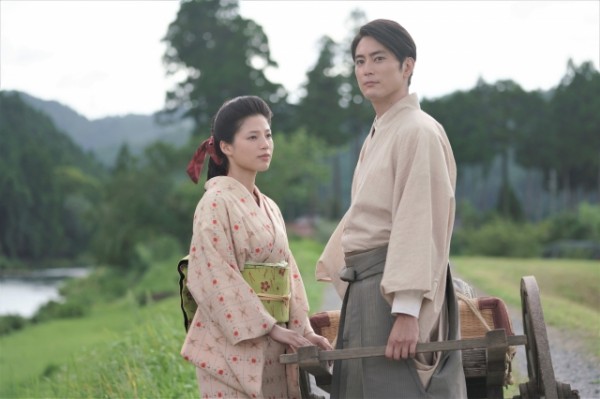
ANNA ISHII AND SHOTARO MAMIYA IN BROKEN COMMANDMENT
New adaptation of Shimazaki's 1906 novel about caste in Japan
Full details of this film can be found on an online page for the June 28, 2022 Foreign Correspondents' Club of Japan sneak preview. This is the third screen adaptation of Toson Shimazaki's 1906 novel Hakai about caste discrimination in Japan. Previously Keisuke Kinoshita dramatized the book in Apostasy (1948) and Kon Ichikawa did so in The Outcast (1962). The term "eta" or "pariah, we see, was still being applied in Japan in the Russo-Japanese war period. It was used to exclude hisabetsu buraku, Japan's untouchables.
In the story, a young man of noble character, Ushimatsu Segawa (Shotaro Mamiya), struggles with the secret he is hiding: that he has links to this caste. His father's "commandment" was never to reveal this, and by not doing so he has gotten a good basic education and now arrives to become a teacher at a country primary school. But Segawa is very conflicted over his secrecy because he knows openness is necessary to fight the injustice of the caste system - which the Meiji Restoration supposedly removed, but survives in practice and mentality. Segawa is a great admirer of well known writer Rentaro Inoko (Hidekazu Mashima), a burakumin rights activist who has recently published a book in which he confesses that he himself is an "eta." Segawa is shamed by this example. His conflict becomes greater when a fan letter he writes gains him an audience with the distinguished, intensely committed author.
Trouble comes early on when Segawa, newly arrived for his country school job, begins to fall for Shiho (Anna Ishii), a sensitive young woman who comes from the former samurai class and resides at the Renge temple where he also comes to live. Try as he may he can't bring himself to reveal his origins to her, but a rival in love for Shiho sets out to undermine him because he is suspicious. Meanwhile every other scene is rife with casual racism, classism, social brutality, indifference to disability, and enthusiasm for war and power. The icky guys are stuffy oldsters who yell out their opinions like actors in a play and shiny young men in western suits; Segawa's purity is signaled by his traditional garb.
Statements about this new adaptation point out that (like a lot of the world) Japan today is going though a new shift to the right as it did "at the end of the Meiji period, with constitutional reform, revision of the Imperial Rescript on Education, and the rise of the opinion that war is inevitable."
The film is glossy, respectable, plodding, and has "well-meaning historical TV drama" written all over it. And in fact director Kazuo Maeda is a veteran of such dramas as well as of promotional and educational films. Reports lead one to suspect that the 1962 film version of the book by Kon Ichikawa (The Burmese Harp, Fires on the Plain, The Burmese Harp) has more dash and flair. This release corresponds with the hundredth anniversary of Japan's first human rights declaration, which designated Burakumin, Zainichi Koreans, Ainu and other "disadvantaged minorities" as deserving of full human rights. Broken Commandment is a pretty good watch if your expectations are not set too high. (The farewell speech to the kids is great - but the long dragged out goodbye is tedious.) The film is both relevant today overall, and a vivid sketch of the social and political mood of 1905 Japan.
The book was adapted for this film by Masato Kato and Norio Kida. Also featured in the cast are Yuma Yamoto, Kazuya Takahashi, Ayako Kobayashi, Kou Nanase, Wooyear Yoshitaka, Shunsuke Daitoh, Naoto Takenaka, Hirotaro Honda, Yohji Tanaka, Renji Ishibashi, and Hidekazu Mashima. A Toei production. International Premiere.
The Broken Commandment 破戒, 119 mins., no data about release, was screened for this review as part of the 2022 New York Asian Film Festival. Japanese theaatrical release July 8, 2022.
For full promotional material about the film (in Japanese): https://hakai-movie.com
NYAFF: Thursday Jul 28, 2022 at 6:30pm (Lila Acheson Wallace Auditorium, Asia Society)
Last edited by Chris Knipp; 07-28-2022 at 12:10 AM.
-
GROWN-UPS わたし達はおとな (Takuya Kato Japan 2022)
TAKUYA KATO: GROWN-UPS わたし達はおとな (Japan 2022)
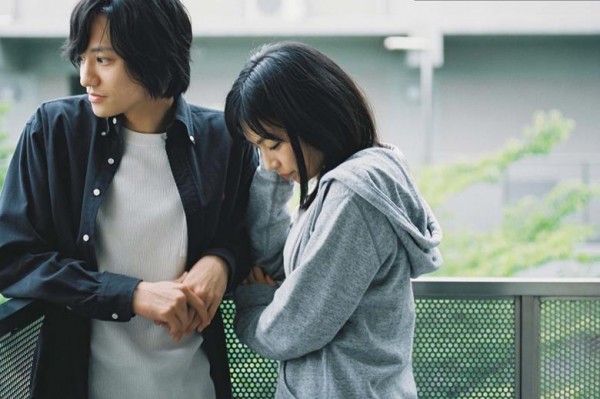
FUJIWARA KISETSU, KIRYUU MAI IN GROWN-UPS
The unexpected pregnancy of an art student
The director and playwright Takuya Kato, who presides over the theater company "Tagumi" and has written for some admired Japanese TV including "Heisei Monogatari," helms his first feature film with Grown-Ups, a little drama set deep in the realities of middleclass early adulthood that's engaging and keeps viewers on their toes. By shooting in a chic, streamlined style and shuffling chronology of scenes, he has made a conventional enough sequence of events feel fresh and different: Kato is being a bit experimental with basically simple stuff. Even though there is nothing earth-shaking and new here, there's a natural, unexpected effect, and these feel like real people and a real situation. Certain Japanese twenty-somethings ought to find a lot to debate about here. For international festival viewers, Takuya Kato represents a new Japanese director with a distinctive writing and visual style.
The dirctor's theatrical background shows in his way with loose, vernacular dialogue, especially as the relationship between the principals, Yumi (Kiryuu Mai), an art student already selling some of her designs, and Naoya (Fujiwara Kisetsu), an young theater director who wants to have his own company, slides into more and more impossible states of disagreement over her surprise pregnancy. Also theatrical is that a great deal of the action takes place in Yumi's rather nice apartment, which, with the good looks of all the twenty-somethings, contributes to the casual chic of everything - without conflicting with the serious subject matter.
They all (the couple and her friends and other college students) seem like attractive young slackers, the mood so casual the viewer thinks for a while nothing much is ever going to happen. And Naoya is apparently not living with Yumi. That's part of being noncommittal and Gen X, right? But serious stuff sneaks up on them, and us, when she does an at-home pregnancy test, it's positive, and suddenly everything changes. Then come more complications. She's not sure Naoya is the father. There's someone else it could have been. She won't say who; she won't introduce him to Naoya. He accepts this. It most likely is his child. He loves her.
But everything is fluid, and in successive scenes and conversations Naoya and Yumi go through all sorts of changes. For a while he is very loving and caring. But nobody is very forthcoming, and this is certailly not something he'd planned on in his idealistic fantasy of becoming a theatrical director. Note she won't reveal the other possible father. Her refusal to get a DNA test, Naoya's very reasonable request, is a stumbling block hat won't go away. "No, let's just raise the child as if it is ours," she says. Really? Then, her mother dies and she goes home and there are scenes with her father (Kenta Satoi), but Yumi doesn't seem to tell anybody about this, except one friend on the phone who says nothing.
Then all of a sudden Naoya, who has still nominally been residing elsewhere, won't let her come to visit him there and admits he's still rooming with his ex! Arguments continue, and one day Naoya gives Yumi the keys back and goes off with his light bags. Scenes have gone back to show early meetings and first sex; then back to a decisive fight; he leaves; and she stands at the stove and fries a couple of eggs.
Grown-Ups わたし達はおとな ("We Are Adults"), 108 mins., was screened for this review as part of the July 15-31, 2022 New York Asian Film Festival. International premiere.
NYAFF: Saturday Jul 23, 2022 at 9:00pm (Walter Reade Theater, Film at Lincoln Center)
Last edited by Chris Knipp; 07-11-2022 at 12:50 PM.
 Posting Permissions
Posting Permissions
- You may not post new threads
- You may not post replies
- You may not post attachments
- You may not edit your posts
-
Forum Rules






 Reply With Quote
Reply With Quote





Bookmarks